
I am adding a second homily to our homily for Sunday 2/1/2015. Both Rev. Deni Ray Doulos and I are serving the homeless and poor. Rev. Deniray recently attended a Conference on how we can respond to poverty and she adds many pertinent facts to our call to follow Jesus in serving those who are left out of society’s plenty and compassion. She is an Episcopal priest who writes convincingly as one who has the authority of lived experience. about Twenty-First Century Demons.
Mark 1:21-28
In the passage from Mark that was read today, Jesus was teaching at the synagogue in Capernaum. It was the first time his newly chosen disciples had heard Jesus teach, and they, along with everyone else present, were amazed with the authority – the clarity – of what Jesus said. He did not speak like a scribe, parroting the scriptures, but as one who understood their meaning in a new and deeper way.
Then suddenly this crazy man starts shouting
“Are you here to destroy us? I know who you are, you the Holy one of God.”
(Mark 1:24)
Now here at Saint John’s we know what would happen if such a thing occurred. Ushers would scramble and get this demon-possessed crazy man out of here. We would all shift uncomfortably in our seats and roll our eyes at this poor crazy person who dares upset our solemn service.
But not Jesus, no indeed. He just said:
Be silent, and calm down!”
(Mark 1:25)
And caused the demons to leave him.
To me there are several observations we can make about this event.
First of all, from the very beginning of His ministry, Jesus spoke new things, unlike anyone had heard before: about the Hebrew law, about how people should love and treat one another, about priorities and what’s important in life. And he spoke and taught as the Primary Source, not a mere commentator: He talked about unconditional love, about a classless and egalitarian society where all care for one another, an all-inclusive, all sharing world without master or slave, Christian or Jew, male or female, rich or poor (Galatians 3:28) – it was radical then, and is radical now!
Secondly, Jesus showed early on the amazing, unworldly, God-like power He had to heal the sick, make the blind to see, change water to wine, cast out mental illness – all actions, then and now, beyond this world. All bigger than any mortal.
Thirdly, this crazy man really ‘got’ it. Of all the observers in the synagogue, he realized Jesus was the Son of God come here to ‘destroy us’ – that is, to change us, transform us, and make us new.
So what has this to do with you and me today in the twenty-first century?
To answer that question, at least in part, I want to share some ideas and facts I learned this past weekend as I attended, via live streaming, the Trinity Institute from Trinity Wall Street in New York City. It was a two and a half day seminar entitled ‘Creating the Common Good’. In reality, it was an in-depth look at economic inequality in our country and in much of the so-called western world: the income gap between the upper 20% and the lowest 20%, which we euphemistically call the ‘poor’.
What is economic inequality?
It is the oppression placed on our global world that creates an environment in which some people suffer, do not have sufficient nutrition or even enough to eat, receive sub-standard or no education, are restricted from voting, receive inadequate or no healthcare, fall prey to drug pushers, pimps and traffickers; they are demeaned through white privilege and inhumanity based on race, ethnicity, gender, sexual orientation or social status. People, who, no matter how hard they try, fall deeper and deeper into the pit of poverty, despair and oppression. And despite more and more wealth being created for some, this gap between the ultra-wealthy and the working poor grows wider and wider.
There are many reasons for this, but a significant one is that we have a crisis of leadership, both governmental and, often, ecclesiastical – everyone seems to be for sale to the highest bidder. Our leaders seem accountability to no one except those who fund them. There is no transparency as to where the money comes from or how the money is spent. Rules on the financial markets and banks have been deregulated so much that these institutions have now become ‘too big to fail’. And are the instruments of greed for a very few billionaires.
Such inequality results in destructive ideologies, encouraging comparisons between individuals, delusions of entitlement (at both ends of the social and economic spectrum), and a slow but sure move toward a totalitarian government in which those in power have no regard for the rest of us.
We hear from politicians and some clergy a myriad of proposed solutions to this inequality –blaming a certain sector of society, such as the last/lost/least, ‘the other party’, socialism, fascism or greed. Everyone wants to point the finger at someone else so they don’t have to take responsibility for their own complicity in our unequal, rigged system.
While about 1% of the US population now controls over 40% of the nation’s wealth, 30% of the working people in our country live at or below the poverty line of $15,000 a year. Added to this there is approximately $100 billion dollars a year stolen from workers by requiring additional work hours for which they are not paid. They cannot protest for fear of losing their jobs. Furthermore, it is expensive to be poor; many live in areas where there are no grocery stores or grocery stores cannot be reached without a car. Nutritious fresh foods are too expensive or not available. Low wage jobs are also physically tiring, leaving little time or energy for healthy food preparation, non-nutritious and fat-loaded fast food seems the only option. These same working poor have little interaction with children or for their own personal development. The homes they can afford are not well insulated or efficiently furnished. Energy bills are out the ceiling. There is a huge disparity in education: rich kids get taught in private schools and poor kids get tested in public schools. Eventually this endless struggle for survival grinds people down until they reach bottom.
Not only is their life more difficult because of our system, but we make life harder for the poor since they are most likely to suffer harassment from the government and police. Of the over 10 million misdemeanors in the country, over 75% of those last year were charged against poor people. Each misdemeanor carries a fine of $200-500 for such offenses as resting feet on the seat of buses or subways and sleeping on park benches. Parents are being fined when their child is truant. In 43 states, the poor are forced to pay for the Public Defender, who is supposed to be provided free if the person cannot afford an attorney (we have all heard the Miranda statement saying an attorney will be provided for free if the arrested cannot afford one). If the person cannot afford the fine, they are imprisoned and then charged room and board for the time they are in jail. If put on probation, 49 states charge for the ankle bracelet. Since 2008, many cities are using these arrests and fines as a supplement to their income, creating even more economic inequality.
It has become illegal in several cities simply to be homeless. If you are sleeping on a park bench you will not be arrested unless you are homeless. There are no laws in this nation that say cities/counties/states must provide services for the poor and homeless. Those existing nationally-supported programs such as SNAP (food stamps) are being cut at the federal level. Moreover, it now illegal in some cities to even feed the poor.
Perhaps worst of all, the church acquiesces to this inequality all too often. Churches create an atmosphere of shame and exploitation for the homeless, poor, people of color or LGBT youth and adults. Our churches are separate, isolated, and ‘comfortable’ in our safe buildings and rituals. We are concerned, in theory, about ‘those people’ – we contribute money but we do not know them, work with them, or share our lives with them. In many ways we place the poor and homeless outside of God; forgetting the mandate from Jesus to:
Feed the hungry, clothe the naked, shelter the homeless
(Matthew 25:35-46)
And we ALL are complicit in this economic inequality!
We deceive ourselves that as long as we are fine, that is all that matters. To quote my grandmother, ‘It all depends on whose ox is getting gored’. We forget that this escalating poverty and economic injustice is, in reality, a risk to our national security, to the very fabric of our way of life.
At the Trinity Institute conference, the renowned American philosopher, author and activities Dr. Cornel West, summed it up appropriately by saying:
“Indifference is more evil than evil itself”.
And we all participate in this indifference.
Again to quote West, indifference shows, really, a lack of love for our neighbors:
“If we don’t, as imperfect people, love our imperfect neighbors with our imperfect love, we are more evil than Hitler or Stalin.”
All injustice could be rescued by the love that Jesus commanded us to show one another in Matthew 12:31:
“Love your neighbor as yourself. There is no commandment greater than this”
So we say, “What can we do?”
We don’t seem to be able to influence the extremely rich or the local/state/federal legislators. The Supreme Court has made a ruling in Citizens United that now equates money to voice – none of us have the monetary resources to counter that interference in our democratic process.
“Hot Button” social issues are constantly used to muddy the atmosphere of our political discourse, so we never really deal with poverty and economic injustice.
Things we can, however, do:
We can acknowledge our own vulnerabilities,
We can acknowledge our own indifference to the mindless consumer culture and skewed economic structure that has fed this inequality for so long.
We can step out, take a risk and honestly speak for and stand in solidarity with the suffering.
We can admit we are complicit in the economic inequality in this global world.
We can stand in solidarity with our brothers and sisters who are poor, jobless, marginalized, segregated.
We can stand together for justice and human rights for everyone.
We can practice unconditional love!
But this is impossible, we say;
maybe not.
Pope Francis gave us a wonderful direction:
“Start by doing the necessary, then do what’s possible; and suddenly you are doing the impossible.”
Here are some things we can do:
- Realize that poverty is not a lack, but a lack of distribution. What do you have in excess that you can give others? How will you work for a tax system that encourages those with much to help those with nothing?
- Seek justice. Learn to recognize where there is injustice and be brave enough to be a truth-teller.
- Work for an economy of sufficiency in which we acquire what we need, not everything we want and be willing to go from ‘good living’ to ‘living good’.
- Take a public stand for an ethical, and fair democratic government, caring for ALL people
- Have dialogue within the Episcopal Church and with other faith traditions to plan strategic actions to ameliorate this economic inequality
- Establish relationships with the marginalized. There are plenty of opportunities to get to know those who are not as fortunate as we are, who have been oppressed by the system. You don’t have to look very far to find someone. In my work with In The Garden, I have come to find the only difference between me and many of the folks living on the land is one bad decision or one unlucky break. We are not all as different as you might think.
- Stand and work for quality education for all, job training, living wages, and fair housing for all.
- Remember every day that our baptismal covenant with God sends us out into the world; get outside the church walls and do the work of Jesus, and encourage your fellow parishioners, and your clergy to do the same.
Like the demon-possessed man at Capernaum, we must recognize who Jesus was and is and passionately work to bring his Kingdom on earth, Rather than squirm in our pews and roll our eyes, realize that if we are to follow Jesus, as we way we do, we must be transformed by his message and his love, and take that message of love to the world. We must be radicals ourselves and cast out the demons of injustice, greed, cruelty, and judgment that plague our world.
The time is now!
Let us go forth to love and serve our Lord by loving and serving one another.
Amen.
To be Delivered at Saint John’s Episcopal Church, Worthington, OH, 1 February 2015
Listen With Your Eyes-Rev. Dr. Judy Lee,Roman Catholic woman Priest,
The context for our Gospel text (Mark 1: 21-28) is the start of Jesus’ ministry. He has been baptized by John the Baptist and filled with God’s spirit of loving affirmation-” This is my Beloved, with whom I am well pleased” (Mark 1: 11) . Jesus then faces a period of trial and temptation, perhaps a period of painful discernment about his call, and then starts preaching “change your lives and believe the good news” as John did, adding “the time of fulfillment is here”, and he calls disciples to follow him. John is quickly imprisoned after this. It is clear that to speak truth to the religious and civil powers that be is extremely dangerous. Jesus moves ahead.
Jesus begins his ministry with powerful and authoritative teaching and actions. He starts with speaking truth to power and clarifying his mission by words and deed. Quoting Isaiah 61 he says “The Spirit of God is upon me… has anointed me to preach good news to the poor….” (Luke 4:18-20). We don’t know what he was teaching in the Mark 1 Gospel, but it may also have been this. And the authority of the Spirit is evident no matter what the words were. His teaching makes them listen and it energizes and challenges the listeners in the synagogues.
As a teacher, a Professor of master’s level social workers including dual degree divinity students, for over twenty-seven years I feel a special connection to this Sunday’s Gospel that heralds the beginning of Jesus’ ministry: “The people were spellbound by his teaching because Jesus taught with an authority that was unlike their religious scholars”(Mark 1: 22- The Inclusive Bible). Most teachers (and all students) know well the sinking feeling of boring a class (and themselves) to death vs. the experience of setting them on fire. For me, when I achieved the latter it was because I spoke with intimate knowledge of the subject , ( I loved the practice of helping others and continue to do so now as I did over 40 years ago) spoke with feeling, and shared my relevant experiences to illuminate the content. My own doctoral dissertation was on students’ perceptions of the teacher’s relevance to their practice given different styles of teaching practice courses (those courses that had to do with how to help people): teaching with feeling, teaching experientially, and teaching primarily cognitively or theoretically. It was not surprising to me that students in two schools of social work overwhelmingly found those teachers who shared feelings with content and experiences instead of bare theory most relevant.In the gospel excerpts that show how Jesus began his teaching, Jesus talks with a God-given authority and then gives a living example before their eyes as to what he is all about. And it both awes and frightens them.
This same account and sentiment is in all three synoptic Gospels-it is important to understand that Jesus spoke with authority (exousia-Gr) (Matthew 7:29; Luke 4:36). Not only did he speak with authority, in these accounts he immediately also acted with power (dynamis). As he spoke and held the listeners spellbound a very disturbed man shrieked at him “What do you want of us Jesus of Nazareth: Have you come to destroy us? I know who you are , the Holy one of God” ( Mark 1:24). In several translations of this passage it is the man who speaks but the man also has an unclean spirit, or demon within him. This means in the original Aramaic that the man was mentally ill-and that Jesus was showing that he had the power to heal the mentally ill, a formidable task,I’m sure, in a day without compassion for the sufferers(indeed some were locked in chains) or psychotropic drugs!! In some translations Jesus is speaking directly to the unclean or demonic spirit “Be quiet, come out of him”. The man, or the spirit within, cries out loudly and the man has a convulsion and is quiet- healed of ‘his demon’ (or two demons, epilepsy and mental illness). In my experience it is often the most disturbed among us that boldly speak the truth, sometimes the truth we do not want to hear. In my own clinical practice of working with people with mental illness, listening carefully to the content that may sound so “crazy” often makes more sense than at first impression. The key to the healing may well be in the words spoken and the feelings that attend them. When I ministered outside in the local park many of the homeless were the untreated mentally ill. It was my challenge to befriend them and motivate them to get the treatment they needed. Sometimes some shouted (one banged a drum or tambourine loudly) all through my preaching or teaching and I often wished I could just “say the word” as Jesus did. While I could not do that, I could slowly but steadily befriend them and ultimately guide them to help, for the most part. When I could not get them to psychiatric help because they could not accept their illness, at least I could make sure they ate and eventually got into housing. With two particular people, it was said that I “worked a miracle” one man who initially frightened everyone sat quietly through the Services, and the other submitted herself to the mental health system and her life was completely changed, though not without some ups and downs. Serving people with mental illness is a gift and blessing of the Spirit. I am thankful that Jesus showed us how to do this with his love, compassion and authority.
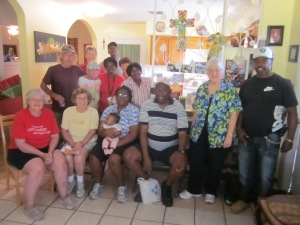
On the spiritual level Jesus demonstrates that he has power over evil spirits. And he also shows that the power he speaks with has God’s authority and power behind it. This is a direct affront to those who have power in the synagogue and those who feel superior to the “unclean and possessed”. Jesus shows his power as a healer as well as a teacher and preacher. He shows us who and what God cares about-the most broken, the most difficult and those who need to learn who God is and what God wants of God’s people-justice, love and inclusion.
The first reading from the Hebrew Scriptures: Deuteronomy 18:15-20 tells the Hebrew people that God will raise up another prophet like Moses and that prophet is to be heard. Clearly the message of the prophets is to be God’s message and not only the prophet’s musings. The Psalmist (PS 95) encourages us: If today you hear God’s voice, harden not your hearts.” The fate of many prophets was to be ignored or even brutalized instead of heard. Jesus has the attention of the people, whether they will get the message or not is yet to be seen. The Epistle (I Cor 7:32-35) admonishes the followers of Jesus to lead a life that makes ample space for God. When there are choices of lifestyle-choose the one that will allow you the most time and energy to be spent with God. How many things there are in life that crowd God out. How our time is spent on so much else! How then are we to hear the voice of God if we have no time to be quiet and listen. Now for Sunday Mass or Tuesday Services I have to say first: please turn off your cell phones-and yet they go off as we are worshiping. Can we not let the world go for even an hour? And how do we know when we are hearing the voice of God through the preacher or the teacher or the church community, or anywhere? We can make time to study the Scriptures and writings that open them to us. We can find places to hear the Gospel preached. But moreover, we can learn to listen with our eyes. Jesus taught with authority and he acted on that authority by touching and entering the lives of the ill, the broken, the outcast, and those who no one wanted to be around and saying his word of healing, compassion and justice. Listening with our eyes means seeing those sharing the word walking as Jesus walked, doing as Jesus did, and the next step is to follow.
Love and blessings,
Rev. Dr. Judy Lee, RCWP
Co-Pastor The Good Shepherd Inclusive Catholic Community in Fort Myers, Florida
Jan 28,2015





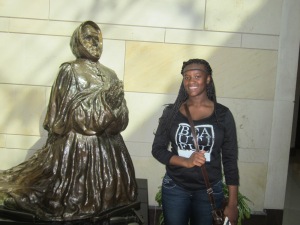






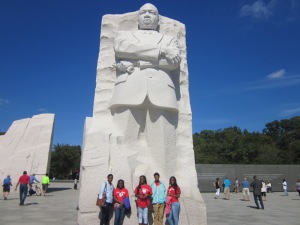
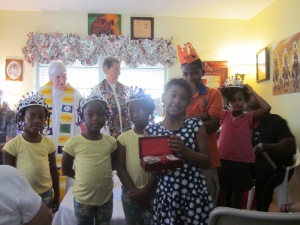



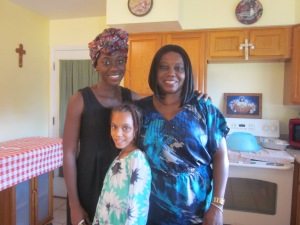











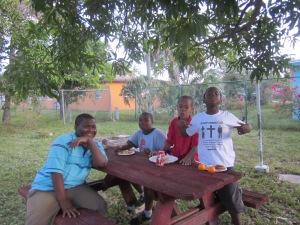
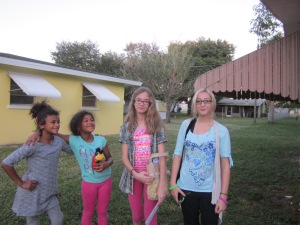










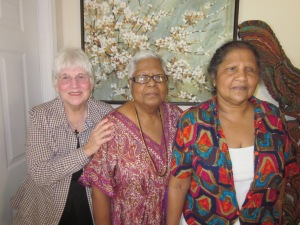












Recent Comments